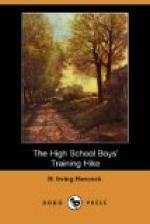“I’ve talked with old soldiers,” Dick went on, “who have told me all sorts of tales of war time, about the commissary train not catching up with the fighting line for four days at a stretch. Yet here you fellows feel almost ill if you have to put off breakfast half an hour. What kind of men would you boys make if it came to the stern part of life?”
“If going without breakfast is part of the making of a man,” said Danny Grin solemnly, “then I’d rather be a child some more.”
“You always will be a child,” Dave observed dryly. “Birthdays won’t make any great difference in your real age, Danny boy.”
“After that kind of a roast,” grinned Reade, “I believe I’ll take a reef in a few of the bitter things I was about to say.”
Dick laughed pleasantly. Somehow, with the walk, all soon began to feel better. That first fainting, yearning desire for food was beginning to pass.
“Do you know what the greatest trouble is with the American people?” asked Dick, after they had covered a mile.
“I don’t,” Tom admitted. “Do you, Dick?”
“I’ve been forming an idea,” Prescott went on. “Our fault, if I can gather it rightly from what I’ve been reading, is that we Americans are inclined to be too babyish.”
“Tell that to the countries we’ve been at war with in the past,” jeered Tom Reade.
“Oh, I guess it’s a different breed of Americans that we send to the front in war time,” Prescott continued. “But, take you fellows; some of you have been almost kicking because breakfast is put off a bit. Most Americans are like that. Yet, it isn’t because we have such healthy stomachs, either, for foreigners know us as a race of dyspeptics. Take a bit of cold weather in winter—–really cold, biting weather and just notice how Americans kick and worry about it. Take any time when we have a succession of rainy days, and notice how Americans growl over the continued wet. Whatever happens that is in the least disagreeable, see what a row we Americans raise about it.”
“I imagine it’s a nervous vent for the race,” advanced Dave Darrin.
“But why must Americans have a nervous vent?” Dick inquired. “In other words, what business have we with diseased nerves! Don’t you imagine that all our kicking, many times every day of our lives, makes the need of nervous vent more and more pronounced?”
“Oh, I don’t know about that,” argued Tom. “I hate to hear any fellow talk disparagingly about his own country or its people. It doesn’t sound just right. In war time, or during any great national disaster or calamity, the Americans who do things always seem to rise to the occasion. We’re a truly great people, all right. But I don’t make that claim because I consider myself ever likely to be one of the great ones.”
“Why are we a great people?” pursued Prescott.
“We are the richest nation in the world,” argued Reade. “That must show that we are people capable of making great successes.”




